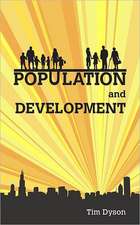Dynamic Demographic Analysis: The Springer Series on Demographic Methods and Population Analysis, cartea 39
Editat de Robert Schoenen Limba Engleză Hardback – 2 mar 2016
| Toate formatele și edițiile | Preț | Express |
|---|---|---|
| Paperback (1) | 928.95 lei 6-8 săpt. | |
| Springer International Publishing – 7 apr 2018 | 928.95 lei 6-8 săpt. | |
| Hardback (1) | 934.64 lei 6-8 săpt. | |
| Springer International Publishing – 2 mar 2016 | 934.64 lei 6-8 săpt. |
Din seria The Springer Series on Demographic Methods and Population Analysis
-
 Preț: 592.75 lei
Preț: 592.75 lei -
 Preț: 385.81 lei
Preț: 385.81 lei - 18%
 Preț: 931.86 lei
Preț: 931.86 lei - 15%
 Preț: 630.97 lei
Preț: 630.97 lei - 18%
 Preț: 936.20 lei
Preț: 936.20 lei -
 Preț: 394.10 lei
Preț: 394.10 lei -
 Preț: 385.99 lei
Preț: 385.99 lei - 18%
 Preț: 934.50 lei
Preț: 934.50 lei - 15%
 Preț: 650.50 lei
Preț: 650.50 lei - 15%
 Preț: 626.15 lei
Preț: 626.15 lei - 18%
 Preț: 933.10 lei
Preț: 933.10 lei - 15%
 Preț: 630.15 lei
Preț: 630.15 lei - 18%
 Preț: 933.59 lei
Preț: 933.59 lei - 15%
 Preț: 631.27 lei
Preț: 631.27 lei - 18%
 Preț: 1095.78 lei
Preț: 1095.78 lei - 18%
 Preț: 1354.28 lei
Preț: 1354.28 lei - 18%
 Preț: 934.33 lei
Preț: 934.33 lei - 18%
 Preț: 930.17 lei
Preț: 930.17 lei - 15%
 Preț: 633.95 lei
Preț: 633.95 lei - 18%
 Preț: 933.71 lei
Preț: 933.71 lei - 18%
 Preț: 932.79 lei
Preț: 932.79 lei - 15%
 Preț: 630.64 lei
Preț: 630.64 lei - 15%
 Preț: 630.97 lei
Preț: 630.97 lei - 15%
 Preț: 631.77 lei
Preț: 631.77 lei - 15%
 Preț: 629.52 lei
Preț: 629.52 lei - 15%
 Preț: 634.11 lei
Preț: 634.11 lei - 15%
 Preț: 677.61 lei
Preț: 677.61 lei
Preț: 934.64 lei
Preț vechi: 1139.80 lei
-18% Nou
Puncte Express: 1402
Preț estimativ în valută:
178.93€ • 185.99$ • 148.35£
178.93€ • 185.99$ • 148.35£
Carte tipărită la comandă
Livrare economică 06-20 februarie 25
Preluare comenzi: 021 569.72.76
Specificații
ISBN-13: 9783319266015
ISBN-10: 3319266012
Pagini: 359
Ilustrații: VIII, 359 p. 89 illus., 87 illus. in color.
Dimensiuni: 155 x 235 x 21 mm
Greutate: 0.69 kg
Ediția:1st ed. 2016
Editura: Springer International Publishing
Colecția Springer
Seria The Springer Series on Demographic Methods and Population Analysis
Locul publicării:Cham, Switzerland
ISBN-10: 3319266012
Pagini: 359
Ilustrații: VIII, 359 p. 89 illus., 87 illus. in color.
Dimensiuni: 155 x 235 x 21 mm
Greutate: 0.69 kg
Ediția:1st ed. 2016
Editura: Springer International Publishing
Colecția Springer
Seria The Springer Series on Demographic Methods and Population Analysis
Locul publicării:Cham, Switzerland
Public țintă
ResearchCuprins
1. Robert Schoen, Introduction: Part One: Analyzing Dynamic Mortality: 2: Filipe Ribeiro and Trifon I. Missov: Mortality deceleration at older ages and the modal age at death.- 3: Michel Guillot and Vladimir Canudas-Romo: Revisiting life expectancy rankings in countries that have experienced fast mortality decline.- 4: Alberto Palloni and Hiram Beltran-Sanchez: The influence of frailty on longevity.- 5: Michal Engelman and Nadine Ouellette: Marking the time of life: Period trends, cohort processes, and the interpretation of mortality changes.- 6: Samuel Schulhofer-Wohl and Claire Yang: Modeling the evolution of age and cohort effects.- 7: Roland Rau and Christina Bohk: Changing mortality patterns and their predictability.- Part Two: Modeling Morbidity: 8: James H. Jones and Ashley Hazel, Mobility and infectious disease.- 9. Jason Thomas: A cohort-component approach for modeling HIV infection.- Part Three: Migration Dynamics10: Cristina Bradatan, Modeling migration effectson population structure.- 11: Victor M. Garcia-Guerrero and Manuel Ordorica: Estimating the population in small areas: An application of the Kalman filter.- Part Four: Population Structure and Its Dynamic Determinants: 12: David A. Swanson and Lucky Tedrow: Cohort change ratios and the approach to stability.- 13: Nan Li: Are low-fertility population pensions sustainable?.- 14: Yi Zeng: Effects of dynamic changes in demographics and retirement age on future pension deficits.
Textul de pe ultima copertă
This volume presents state of the art analyses from scholars dealing with a range of demographic topics of current concern, including longevity, mortality and morbidity, migration, and how population composition impacts intergenerational transfer schemes. New approaches are applied to such issues as measuring changes in cohort survivorship in low mortality populations, patterns of mortality improvement at older ages, and the consequences of heterogeneity in the susceptibility to death. Studies examine models of the current status of the HIV/AIDS epidemic, advance present methods for estimating population change in small areas, and strive to disentangle age, period, and cohort effects. In sum, the book addresses key contemporary issues in measuring and modeling dynamic populations, and advances the frontier of dynamic demography.
Caracteristici
Presents state of the art work on the demography of populations with changing rates Addresses key contemporary issues in measuring and modeling dynamic populations Advances the frontier of dynamic demography













